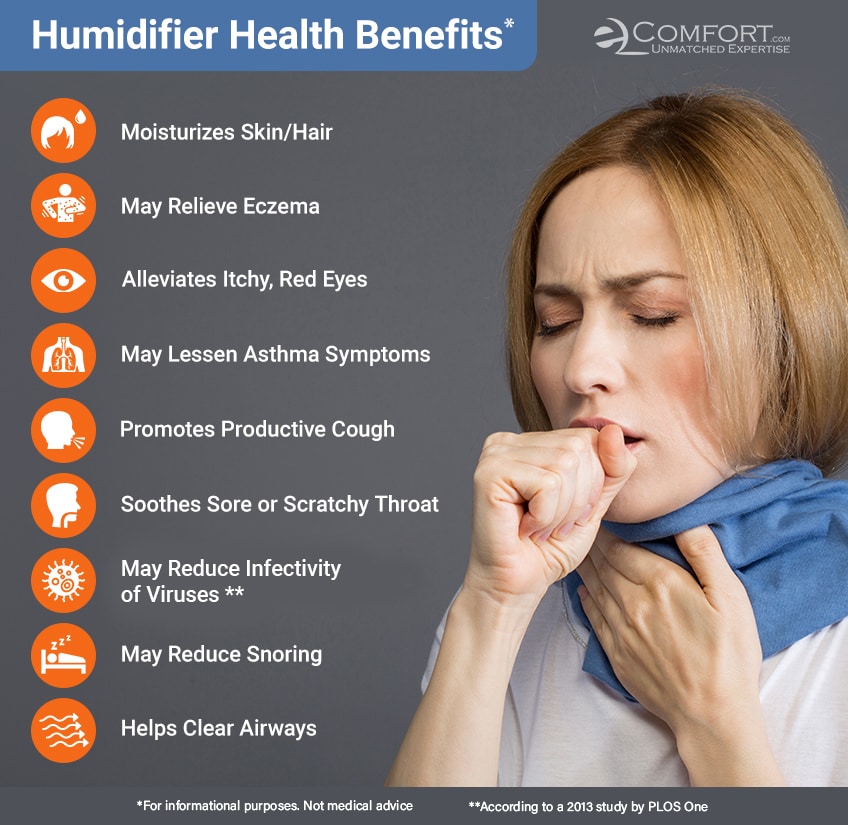
Health Benefits of Home Humidifiers
Stay Healthy With a Humidifier
Cracked lips are no fun. They’ll often begin healing only to crack in the same spot. Itchy eyes are another nuisance. The more you scratch, the more they seem to itch!
In many cases, these symptoms could have the same root cause: the air in your home is too dry, or not humid enough.

We often hear the word humidity used negatively like “it’s hot and humid outside.” However, humidity is necessary in moderation, and you might be surprised to learn about the health benefits of air humidifiers.
From using a humidifier for dry skin, to running a humidifier for cough relief, you will find ample reason for adding a little moisture to your home, especially during winter or if you live in an arid climate or high altitude.
What is Humidity?
Humidity is the amount of water vapor in the air. When there is too much, we feel extra hot because our sweat can’t evaporate well, and sweating is our body’s natural way of cooling down.
On the flipside, if there is too little water vapor in the air, our bodies will start to dry out, which we’ll discuss below. Ideally, you want to keep the humidity in your home between 40-60%. Humidifiers can help your home stay within this healthy range by adding water back into the air.
Keep Your Skin and Hair Healthy
There’s a big market for skin moisturizers during winter because the low humidity dries
From an aesthetic point of view, we all know how dull and lifeless dry skin can look, not to mention it can form wrinkles and age prematurely. You’re also more likely to have frequent bad hair days and an itchy scalp when the air is too dry.
Instead of constantly putting on moisturizer, you can use a humidifier to moisturize your home’s entire air volume and reduce dry skin and frizzy hair.
Say Goodbye to Dry Eye
Even if you don’t get an infection, dry eyes will feel itchy, tired, and look red. The problem will be worse for people who wear contacts or work on a computer all day. Use a humidifier to fight dry eye and see more clearly.
Breathe Better
This can make life especially hard for people with asthma. Dry air can irritate nerves in the lungs, causing airways to constrict. That’s why having a humidifier for asthma-related symptoms may be recommended. It also can help clear your airways and give you a more productive cough if you're sick.
Finally, increasing humidity can help with snoring by soothing airways. So if you are sick of your spouse snoring or vice versa, a humidifier could help you sleep more soundly.
Fight Illness
In a study conducted at the University of Illinois in Chicago, researchers found that maintaining indoor humidity levels at 40% or more significantly reduces the infectivity of airborne viruses*, such as the flu.
Overly dry air can also make your body more susceptible to catching an illness. Your upper respiratory system, including your nose and throat, is lined with membranes that capture incoming germs. If these membranes dry out too much, it becomes easier for cold and flu germs to pass through.
A humidifier can slow those airborne germs down while helping to moisten your respiratory membranes for double protection.
Get the Right Humidity
Having a humidifier is the easiest way to add moisture to your home and keep your body from feeling like you’ve been wandering in the desert for 40 days.
Just remember not to keep your home too humid, as that creates its own discomfort and mold problems. Also, clean your humidifier and replace the water panel (if it is an evaporative type) regularly to avoid microbial buildup from the water.
*Note: This article is for informational purposes only. Not Medical Advice.
